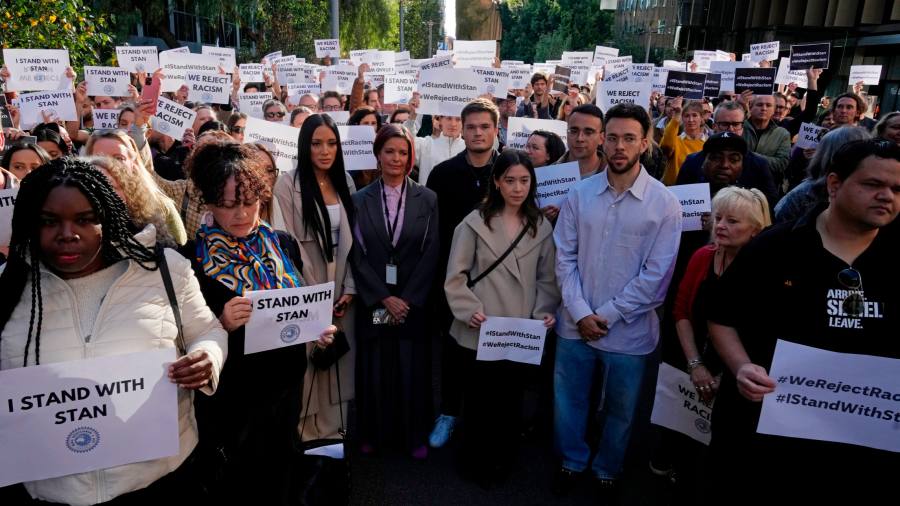After more than 30 years in the public eye, Australia’s best-known indigenous journalist has stepped back from broadcasting after facing racial abuse, sending shockwaves through the country as it gears up for a referendum this year on enshrining indigenous rights in the constitution.
Stan Grant, an author and a journalist, said he would stand back from his role presenting a current affairs programme on public broadcaster the Australian Broadcasting Corporation. He had received a torrent of abuse for his role in the broadcaster’s coverage of the coronation of King Charles III, when he had spoken about the effects of colonialism on indigenous people.
Grant, a 59-year-old Wiradjuri man, closed Q+A, the show he has hosted for two years, this week with a powerful speech addressing those who had targeted him online.
“If your aim was to hurt me, well you’ve succeeded,” he said. “I’m sorry that I must have given you so much cause to hate me so much, to target me and my family, to make threats against me,” he said.
The public fallout comes months ahead of a referendum — known as “the Voice” — in which Australians will be asked to vote on whether to amend the constitution to include a symbolic recognition of indigenous people and to establish an advisory body on political affairs that affect indigenous communities.
Stan Grant makes an emotional speech addressing those who had targeted him online © Australian Broadcasting Corporation / Reuters
Veteran journalist and author Stan Grant makes an emotional speech addressing the people who had targeted him online © Australian Broadcasting Corporation / Reuters
Grant’s departure has added to tensions over the vote, which was proposed by the Labor government of Australian prime minister Anthony Albanese. The recognition of First Nations people, who have long been victims of discrimination and prejudice, was one of Albanese’s central election pledges.
Opposition to the vote, which is expected to take place between October and December, has grown in recent months.
Peter Dutton, leader of the opposition Liberal party, has said he will campaign for a “no” vote, arguing that a Canberra-based advisory body will not benefit rural communities.
Albanese said critics were spreading “misinformation” about the referendum by implying that the advisory body’s remit could be too broad.
“When ‘no’ campaigners make these wild claims about what the Voice will concern itself with, I simply say to them — and indeed to all Australians following this debate — ‘for just a moment, put yourself in the shoes of the people calling for this change’,” the prime minister said.
Tim Soutphommasane, chief diversity officer at Oxford university and previously Australia’s race discrimination commissioner, said the furore around Grant “confirms the challenge that lies ahead for the ‘yes’ case for an Indigenous Voice. Racism and race politics are threatening to derail the push for constitutional reform.”
Karen Mundine, head of non-governmental indigenous organisation Reconciliation Australia, said the scandal had arisen within a wider context of the racial vilification of indigenous sports stars, such as Australian rules football player Adam Goodes. She cited data from the country’s online safety commissioner that showed a 10 per cent jump in complaints about online racial abuse since the referendum campaign began.
“These incidents, and the recent racist abuse of numerous First Nations sporting stars, demonstrated once again that Australia still has a long way to go towards building a reconciled and just society,” she said.
The situation triggered a crisis at the ABC after Grant accused the broadcaster of “institutional failure” for not defending him against the racial abuse. ABC staff walked out this week in support of the veteran journalist. The broadcaster’s executives have apologised to Grant for not stepping in to support him more quickly.
Justin Stevens, the ABC’s director of news, told a Senate hearing on racism this week that Grant had become the “public face” of criticism of the broadcaster’s coronation coverage despite only being a guest on the 40-minute segment, which was part of an eight-hour broadcast.
Stevens said that Grant — the author of The Queen Is Dead, a book about the Crown’s role in the colonisation of indigenous Australians — had become a target for “vitriolic abuse” and “toxic, racist” online commentary.
The ABC received 1,800 complaints about the segment from viewers, “hundreds” of which were racist in tone, according to David Anderson, the ABC’s managing director. “I’m worried about our First Nations staff particularly as we head towards the Voice to make sure that they are sufficiently protected,” he told the Senate hearing.
Grant ended his address on Q+A this week with a pointed comment on print and digital media, which both the ABC and Grant have blamed for stirring up anger towards him. He said the media was too often “a poison in the bloodstream of our society” that was not “truly honouring a world worth living in”.
“I am not walking away for awhile because of racism. We get that far too often. I am not walking because of social media hatred,” Grant said, as he ended his show. “I need a break from the media. I feel like I’m part of the problem. And I need to ask myself how, or if, we can do it better.”
Read the full article here




